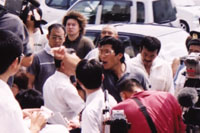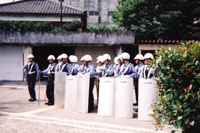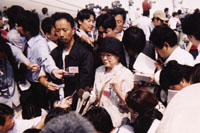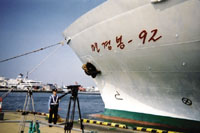The Pulse 1
Back to Contents of Issue: October 2003
|
|
|
|
by Leo Lewis |
|
 DISMISSED AS AN IRRELEVANCE by some, decried as a tool of the devil by others: Whatever else the dreaded Mangyongbong-92 may be, its voyages to Japan are unremittingly controversial.
DISMISSED AS AN IRRELEVANCE by some, decried as a tool of the devil by others: Whatever else the dreaded Mangyongbong-92 may be, its voyages to Japan are unremittingly controversial.
The late August docking of the Mangyongbong-92, a blocky white ferry that sporadically makes the 12-hour crossing from Wonsan in North Korea to Niigata in northwest Japan, delivered all that Japanese media hype promised. Its short visit to Japan was acrimonious, fiery, and reminded the watching world -- as if it needed any prompting -- that in this part of East Asia, the cold war is still hot.
The ship chugged into port on the eve of the six-way talks -- involving the United States, China, Japan, South Korea, China and Russia -- on North Korea and its atomic weapons ambitions. For seven months the Japanese authorities made it clear that the Mangyongbong would be rigorously inspected as soon as it made it into Niigata. Any faults, and future visits would be off.
Behind the Japanese position was an appreciation of the strength of public feeling toward the boat. Years of suspicion about the historical voyages of the boat have more recently turned into hard news stories. There is increasing evidence that it has been used to transport drugs and weapons into Japan, and that on the return journey its deep holds have been used as the mule for missile parts, pachinko money and other worrying technology. When, last year, Pyongyang admitted that it had abducted Japanese citizens throughout the 1970s and 1980s, it was immediately assumed that the Mangyongbong was the vessel that had been used to kidnap them.
The Japanese message kept the ferry away from Japan for most of 2003 -- one visit was cancelled at the very last minute because the North Koreans, as everyone in Niigata knew full well, had not equipped the Mangyongbong with a device that sends an electronic warning to other vessels in the area.
So the appearance of the ferry provided a set of hugely important clues about the attitudes of the two sides -- capitalist and communist. Unwittingly, the boat could even hold the key to the eventual stability of the entire region -- more on that later. At the quayside on August 25 there were plenty of people declaring how sinister it all was. There were the sober NHK men reminding the morning TV audiences of the murky history of the ship and its visits to Japan. There were Niigata residents who had built up a series of wild rumors about the expected cargo of the return journey to North Korea. A favorite theory was that it would contain mainly luxury food items and other treats for Kim Jong Il, in readiness for the North Korean national celebrations on September 9. All this was, of course, hotly denied by the head of the North Korean Residents Association, who was keen to point out that the Japanese inspectors of the Mangyongbong were merely performing their duties at the behest of the Bush administration.
In the end, the scene reduced the epic conflict of capitalism and communism to a very human showdown. Waiting on the quayside were 120 specially selected Japanese protesters. A handful of them were family and friends of the Japanese citizens kidnapped by Pyongyang during the 1970s and 80s. Their anger at North Korea is justifiable, but it is harder to explain the mouth-foaming fury of the rest of the crowd. With well-rehearsed punching of the air, they screamed abuse at the boat and demanded its immediate return to North Korea.
Later in the day, however, the Niigata port-side authorities proved once and for all that what a baying mob can't achieve, 30 bureaucrats with clipboards can. After more than six hours of inspections, Japanese poring over the boat found five trumped-up reasons to hold it in its dock for about 12 more hours than intended. The ship left on Tuesday evening with about 100 students on board.
So where does this all fit into the stability of the Korean peninsula and the security of East Asia in the face of an overt atomic weapons program by an outlaw state? The answer lies in the fury of the Japanese crowd at Niigata. The admission in 2002 that Pyongyang had kidnapped Japanese citizens created the double potential for war or peace. On the human level, the Japanese families and friends of the abductees are entitled to their anger and outrage. For the politicians, the abductee issue creates the perfect theater for negotiation. As matters stand, Japan has a series of demands relating to the abductees -- more information on those that have died, their ability to make return visits to their families in North Korea and a host of other concessions. North Korea needs money and assurances of security.
Either way, the abductee issue is at the heart of all of this. Pyongyang does not have to compromise much to tell Japan what it wants to hear, and the rewards for doing so would be very considerable. Russia, China, the US and South Korea would also be delighted, as it would allow them to support Japan's financial donations should they come. As the Mangyongbong-92 steamed off towards North Korea on August 26, even the Japanese protesters, again ranged along the port, could sense that this was about something more important than the 12-hour crossing of a rusting old ferry. @ |
|
Note: The function "email this page" is currently not supported for this page.


 But the summit nature of the August talks prompted the Japanese to soften slightly, and the North Koreans to take a chance that the boat would make it through the inspections. Even Pyongyang knew that the talks were critical -- Kim Jong Il had managed to get the US to the negotiating table, even though the stances of the two sides were incompatible. The talks represented the last real opportunity to settle the nuclear crisis in a peaceful way. War is not the immediate price of a failure to reach a diplomatic settlement, but it would be at the end of a chain of events set off by a collapse in negotiatons.
But the summit nature of the August talks prompted the Japanese to soften slightly, and the North Koreans to take a chance that the boat would make it through the inspections. Even Pyongyang knew that the talks were critical -- Kim Jong Il had managed to get the US to the negotiating table, even though the stances of the two sides were incompatible. The talks represented the last real opportunity to settle the nuclear crisis in a peaceful way. War is not the immediate price of a failure to reach a diplomatic settlement, but it would be at the end of a chain of events set off by a collapse in negotiatons.
 As the ship disgorged its passengers and cardboard-boxed cargo, the protests were taken over by the sinister black buses of the 20-odd Japanese far-right groups who had traveled from far and wide to pump crude anti-Korean rhetoric over the giant loudspeakers mounted on their vehicles.
As the ship disgorged its passengers and cardboard-boxed cargo, the protests were taken over by the sinister black buses of the 20-odd Japanese far-right groups who had traveled from far and wide to pump crude anti-Korean rhetoric over the giant loudspeakers mounted on their vehicles.
 Japan, under the US nuclear umbrella and for so long an apparent irrelevance to security considerations, has now earned itself a crucial role at the hexagonal table. The US, for ideological and political reasons, cannot give the Pyongyang regime the money it needs to begin the process of reconstruction. The Bush administration, with its talk of an "axis of evil," has rendered North Korea too hot a political potato to forgive so quickly. Japan, on the other hand, has plenty of money and would make the perfect route for cash to be channeled into North Korea should the atomic issue be resolved to Koizumi's satisfaction. Japan would describe the money as "humanitarian aid," while Pyongyang would likely call it "war reparation."
Japan, under the US nuclear umbrella and for so long an apparent irrelevance to security considerations, has now earned itself a crucial role at the hexagonal table. The US, for ideological and political reasons, cannot give the Pyongyang regime the money it needs to begin the process of reconstruction. The Bush administration, with its talk of an "axis of evil," has rendered North Korea too hot a political potato to forgive so quickly. Japan, on the other hand, has plenty of money and would make the perfect route for cash to be channeled into North Korea should the atomic issue be resolved to Koizumi's satisfaction. Japan would describe the money as "humanitarian aid," while Pyongyang would likely call it "war reparation."



